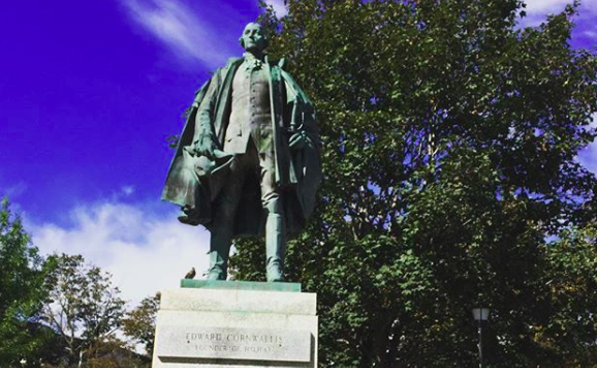
via Lolly willowes on Instagram
Jebediah Springfield was nothing more than an evil bloodthirsty pirate who hated this town.
Edward Cornwallis is coming down off his pedestal, at least for a while.
Halifax Regional Council voted Tuesday to remove the controversial bronze statue of the city’s founder and place it into temporary storage. There it will remain until a more permanent solution can be agreed upon in the spirit of truth and reconciliation.
“We are all a product of our history, but we don’t have to be a prisoner of it,”
The last-minute agenda item recommending the statue’s removal came just days after the Assembly of Nova Scotia Mi’kmaq Chiefs walked away from HRM’s special committee on Cornwallis’ legacy, calling for the monument to be taken down immediately.
Staff’s subsequent recommendation—made in advance of a protest originally planned for this weekend—was as much practical as symbolic. The statue has, staff writes, increasingly “become a flashpoint for protests,” which poses a “reputational risk” to the city.
But for many councillors, toppling the statue was a historic step to rebuilding the relationship between HRM and the Mi’kmaq nation.
“All the statue contributes to our community right now is a flashpoint for
A now infamous military commander who’s increasingly known for his colonial intolerance and cruel violence towards the area’s Indigenous population, Cornwallis also settled the city of Halifax in 1749. That same year, he issued a bounty on Mi’kmaw scalps.
A statue cast in his likeness has stood in the south end park that’s also named in his honour since 1931 when it was erected by the Canadian National Railway to boost tourism.
Calls to remove Cornwallis’ name from civic commemoration and take down the bronze statue have been ongoing for decades, but they reached a fever pitch over the past 10 months.
Inspired by poet laureate Rebecca Thomas’s performance, last April councillor Shawn Cleary motioned for a special committee to look into the continued celebration of Cornwallis on civic infrastructure.
A confrontation between Indigenous activists and Cornwallis-defending “Proud Boys” on Canada Day further ratcheted up tensions on an already divisive local issue. Protesters assembled later in July in hopes of tearing down the statue themselves. Those plans were calmed after mayor Savage and city hall briefly covered Cornwallis with a tarp in a gesture of good faith.
Although emotional, the hour-long debate on Tuesday was nowhere near as heated as some of those previous discussions regarding Halifax’s problematic founding father.
Councillor David Hendsbee argued Cornwallis should instead be moved to any one of several more prominent locations in the city, including the top of Citadel Hill, outside City Hall or the Waterfront.
“We should not be hiding our history,” the councillor exclaimed.
Stephan Adams, who printed off an online definition of “reconciliation” to read out loud, expressed a desire to turn Cornwallis Park into a “Founders Plaza” where “at some point, reconciliation will happen.”
Those arguments weren’t persuasive enough to convince their colleagues.
“For anybody to get their shorts in a knot over a piece of bronze, well that’s too bad,” said Steve Craig.
“Statues are not how we record history,” said Lisa Blackburn. “Books and museums are for that. Statues are how we glorify history. Reconciliation begins with
Councillor Bill Karsten implored his colleagues to hear the day’s arguments with an open heart and an open mind. The Dartmouth
“I’m not embarrassed in the least to say that where I am now is not where I was even a month or two ago,” said Karsten, who strongly supported staff’s recommendation.
The motion approved also asks HRM to try again with the Assembly of Chiefs to continue the Cornwallis panel’s work
As was discussed somewhat obliquely by
Mayor Savage told council his office and deputy mayor Mason met with the Assembly to discuss the “issue” with its nominees, but it appears no resolution was reached. [Update: Speaking off-the-record, several city hall officials now have confirmed to The Coast that Marshall's inclusion was the main delay in setting up the panel.]
In a press release sent out Tuesday afternoon, the Assembly of Chiefs said council’s decision would “re-open doors for real nation-to-nation discussions.”
“We've had a long road to bring us to where we are today, from the signing of our Peace and Friendship Treaties centuries ago, to today's discussions of the HRM,” writes Chief Terrance Paul, co-chair of the Assembly. “We have a unique history in Nova Scotia, and we look forward to how we can tell that story, together, with our Treaty partners.”
The Cornwallis motion ultimately passed 12-4, with Hendsbee, Adams, Matt Whitman and Russell Walker against.
No immediate timetable was given for when the statue will come down, or where it will be stored. Staff estimate the cost of bringing Cornwallis back down to Earth should run around $25,000.
